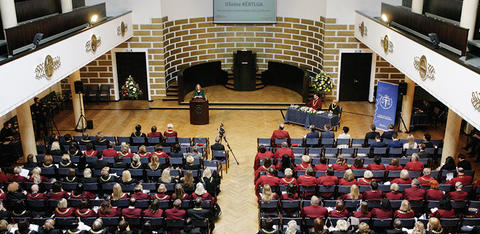One visit to Latvia wasn’t enough for Jane Kirtley, and two might not have been either.
By Alex Smith
Jane Kirtley noticed big changes in the media environment during her return to Latvia last spring. The Silha Professor of Media Ethics and Law at SJMC had visited in 1993 for a Freedom Forum conference on libel law, and that experience led her to apply for a position at the University of Lativa almost two decades later. This time she returned as a Fulbright Scholar at the University of Latvia in Riga to teach as a member of the law faculty.
The changes between then and now were noticeable. “It feels more European,” said Kirtley, contrasting her experience to the more “Soviet feel” of her previous visit. “It feels like there’s more freedom.”
Kirtley taught two classes at the university: Media Ethics and U.S. Media Law. Her students came from countries across the globe, including Russia, France, Hungary and Colombia. That mix of perspectives, according to Kirtley, created a dynamic interplay that enriched the rigor of the course. Class sizes were small as well, ranging from three to five students.
“It was a terrific experience,” Kirtley said. “I enjoyed the ethics class a lot because with the students coming from a variety of countries, they had a lot of different perspectives.”
One of Kirtley’s students grew up in St. Petersburg, Russia, and distrusted the press and doubted its credibility. “She didn’t believe anything she saw,” Kirtley said. “Living and growing up in Russia, she was used to a government-controlled press. Her skepticism was very understandable.”
Kirtley used some of the same teaching methods she employs at SJMC. For example, her students in Latvia read Bill Kovach and Tom Rosenstiel’s The Elements of Journalism to study “journalism of verification,” the practice of relying on facts and evidence in news reporting rather than on opinion or bias. Her students also watched the movie Spotlight, the Academy Award-winning film about how an investigative team at The Boston Globe uncovered widespread sexual abuse by priests. She believes the film was a wonderful vehicle for talking about investigative reporting in the United States.
“The students loved it because none of their professors had ever had them watch a movie as an assignment,” she said. “They were fascinated and intrigued by the idea that U.S. journalists would take on a powerful institution like the Roman Catholic Church.”
Outside of class, Kirtley helped law students prepare a moot court team for an international competition at the University of Oxford, where they argued a free-speech case. According to Kirtley, the team did very well and made it through the third round of competition, where they were defeated by the team that came in second overall.
Interacting and learning about the history and current state of Latvia was also important to Kirtley. At a plenary session at the National Latvian Judges’ Conference last May, she spoke to more than 400 judges about media relations between courts and the press.
“They told me they loved my speech, and that it was very timely,” Kirtley wrote in an email to a colleague about her experience. “Specifically, the Monday after my talk, the judicial ethics committee was examining a case involving a judge who had friended a government official on Facebook… I had talked [in my speech] about the risks of social media, of course, and specifically a situation like that.”
One of the Latvian Supreme Court justices in the audience, Marika Senkane, was eager to meet Kirtley and give her a tour of the courthouse. Senkane started as a secretary to the court during the Soviet era and was the presiding judge in the Lujans case in 1988, which is regarded as the first instance of judicial independence in Latvia during the Soviet era. The judges acquitted a man accused of “bringing disrepute to the Soviet state and social order” and the presiding judge refused to convict him, which caused tremendous public reaction. They carried the defendant out of court on their shoulders in triumph, although Kirtley believed the judge deserved more recognition for his decision.
“I think the person who should’ve been carried out was the judge,” Kirtley said.
Through this experience, Kirtley was able to learn more about Latvia’s history and how past countries’ control of the region still impacts the population and media environment today. She heard many stories about the changes between the era of independence, the occupations by Russian, Germany and then the USSR, and the transition to independence again.
Today, Latvia still struggles with its government transparency as well as the fact that many of its citizens speak different languages. Russian remains prominent in the country, despite laws that make Latvian the official language. Russian media outlets, like Sputnik and RT, broadcast propaganda in Russian, which means that the country’s Russian speakers get their news from those sources.
Latvia, along with other Baltic states, is also actively worried about the possibility of invasion. “This is not just a theoretical issue,” Kirtley said.
Although Kirtley is happy to be back in the United States, she says she would go back to Riga in a heartbeat. “I miss everything about being there,” she said.
